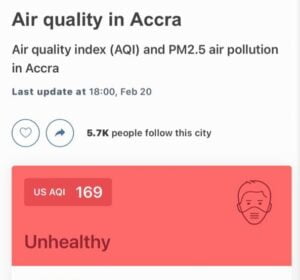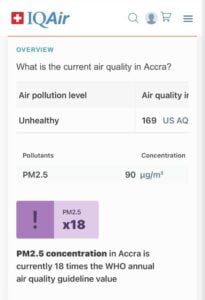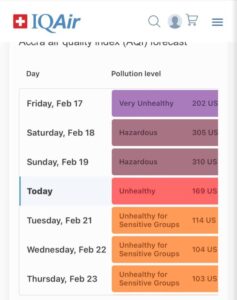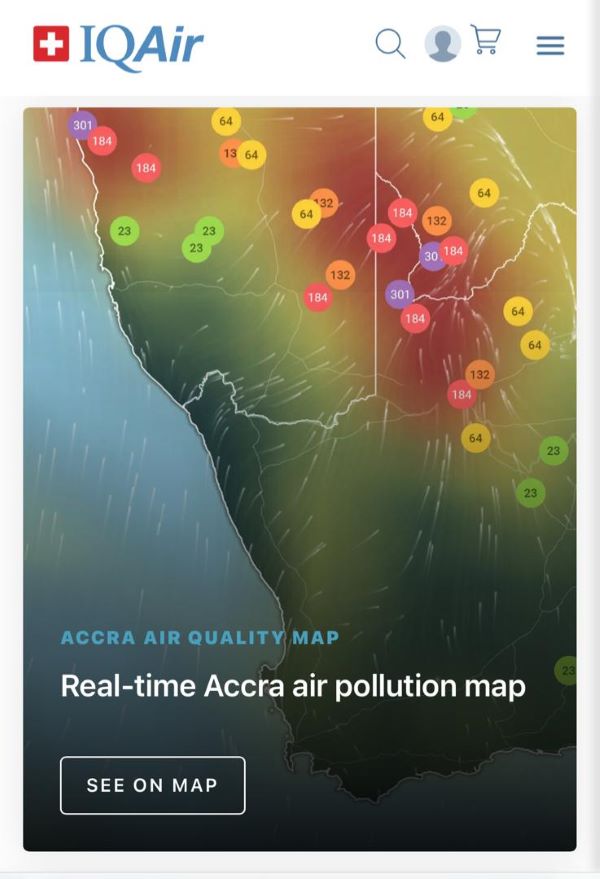Swiss air quality technology company has cautioned Ghana about poor air quality especially in the capital Accra and suggested precautionary measures to avert respiratory diseases from the polluted air.
The air quality technology company’s core mandate is to protect against airborne pollutants, develop air quality monitoring and air cleaning products as well operates AirVisual for exploring air quality data in a particular geographic location.
IQAir’s AirVisual evaluated Ghana’s air quality above 49.6 times the WHO annual air quality guideline value rendering it unhealthy.

unhealthy air qualithy
It further points to high concentration of PM2.5 which include particles found in the air, such as dust, soot, dirt, smoke and liquid droplets with a diameter of 2.5 micrometers or less.
According to the IQAir, a higher concentration is in Accra’s atmosphere and may not be the regular harmattan weather as believed by many but regional dust storms pounced onto the Southern part of the country.

current air quality in accra

pollution per day
Warning From Health Officials Regarding the Polluted Air in Accra
IQAir and other health officials warn that these particles are tiny and can easily affect one’s organs and the whole body but first affecting the respiratory tract.
What are some health risks associated with breathing polluted air in Accra According IQAir?
Some prominent health risks that may present themselves to those who are subject to overexposure to high levels of air pollution, or from prolonged exposure, would be ones typically of the cardiac or pulmonary variety, although not entirely limited to these areas of the body, due to the highly pervasive nature of air pollution.
- The incredibly small size of PM2.5 allows it to enter the blood stream via the lungs, where it can wreak all manner of havoc on the various organ systems of the body.
- Damage to the blood vessels can be incurred, along with the liver and kidneys (hepatic and renal systems) being affected, due to their role as filtration and cleaning systems within the body.
- Damage to the heart is an ongoing issue, with massively increased rates of ischemic heart disease, heart attacks and arrythmias all being possible.
- Ischemic heart disease can occur when the tissue of the organ fails to receive enough oxygen and gets damaged as a result.
- Other issues include scarring or inflammation of the lung tissue, which can lead to a reduction in full lung capacity, along with increased risk of developing chronic obstructive pulmonary disease (COPD), an umbrella term that includes within it further respiratory ailments such as pneumonia, bronchitis, emphysema and aggravated forms of asthma.
- Irritation to the skin can also occur, with conditions such as atopic dermatitis, eczema, psoriasis and varying forms (in their severity) of acne making themselves present. Those with a hypersensitivity towards pollutants or fine particles will be particularly at risk for such conditions to occur.
- Aggravation of the mucous membranes may also happen, with the mouth, eyes, ears and nose all being affected.
Who is vulnerable to Polluted Air in Accra and how to prevent respiratory diseases (IQAir)
Due to the highly damaging effects of pollution exposure on vulnerable members of society, i.e.
- Young children
- The elderly
- Pregnant women
- Those with heightened sensitivity towards pollution.
- And those with pre-existing illnesses or compromised immune system.
Meanwhile, the Ghana Meteorological Agency has forecasted widespread dust haze and dryness across the country.
The population is advised to do the following to help protect and avert any health problems from the Polluted Air in Accra.
- Wear a mask outdoors
- Run an air purifier
- Close your windows to avoid dirty outdoor air
- Avoid outdoor exercise


